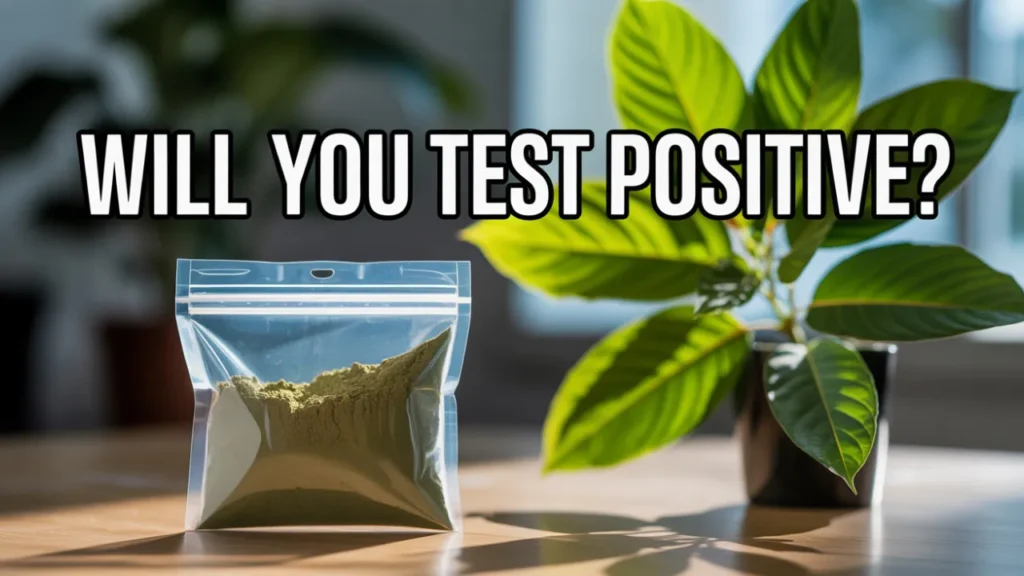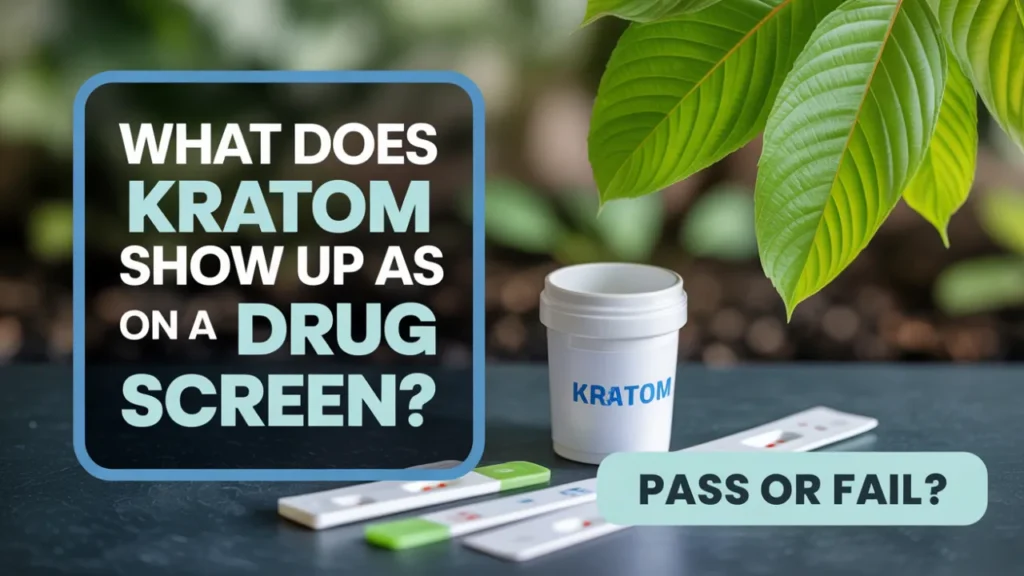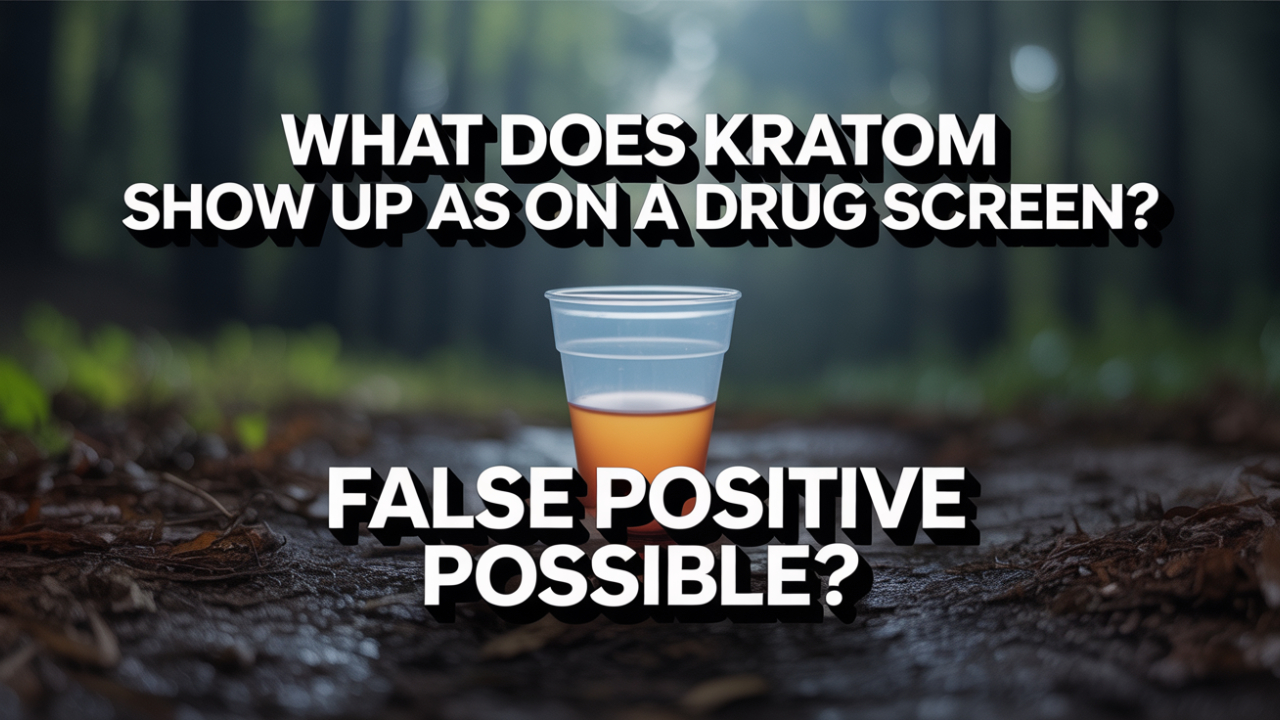What Does Kratom Show Up As On A Drug Screen?
Lynk Diagnostics provides reliable drug screening tools that help identify substances like kratom. If you’re wondering what does kratom show up as on a drug screen, you’re not alone. With the increasing use of mitragyna speciosa, understanding how kratom interacts with various testing methods is vital for clinical professionals, law enforcement, and individuals under supervision.
This blog explains what kratom is, how its active ingredient mitragynine behaves in the body, how drug testing technologies like urinalysis, mass spectrometry, and saliva testing work, and whether kratom will be flagged on a drug test. We’ll also explore how Lynk Diagnostics offers accurate urine test cups and laboratory testing options to detect kratom in various matrices.
What Is Kratom?
Kratom comes from the mitragyna speciosa tree native to Southeast Asia. The plant’s leaf contains psychoactive alkaloids, primarily mitragynine and 7-hydroxymitragynine.
These compounds interact with opioid receptors in the brain, producing effects similar to opioid or stimulant medications. At low dose levels, kratom acts as a stimulant, increasing productivity and alertness. At higher doses, it has sedative and pain management effects, often linked with euphoria, nausea, vomiting, and constipation.

Why Is Kratom Being Tested?
Kratom is not currently classified as a controlled substance under the Controlled Substances Act, but the Drug Enforcement Administration has considered scheduling it due to rising substance abuse, mental health, and public safety concerns.
Employers, courts, probation officers, and health providers may request testing for kratom due to its use as an opioid substitute or in relation to prescription drug addiction, mental health treatment, or risk of relapse.
Will Kratom Show Up on a Standard Drug Test?
Standard 5-panel or 10-panel urine tests typically screen for:
- Opiate
- Amphetamine
- Methamphetamine
- Benzodiazepine
- Barbiturate
- Cannabinoid
- Phencyclidine
- Cocaine
- Methadone
- Buprenorphine
Kratom will not automatically trigger a positive on these panels because its alkaloid structure differs from substances like morphine, oxycodone, tramadol, fentanyl, or adderall. However, specialized tests using liquid chromatography and mass spectrometry can detect mitragynine or its metabolite.
What Does Kratom Show Up As On A Drug Screen Specifically?
Kratom does not show up as a known narcotic, stimulant, or barbiturate unless the test is tailored to detect kratom’s active ingredients.
In advanced testing methods, kratom can be identified by its unique metabolite signature. Using LC-MS/MS (liquid chromatography–mass spectrometry), labs can detect mitragynine in urine, blood, saliva, or hair follicle samples. This is commonly applied in clinical pathology and forensic toxicology settings.

Types of Drug Testing for Kratom
Urine Drug Testing
Urinalysis is the most common method for kratom detection. Mitrogynine is excreted through the gastrointestinal tract and stomach, making urine an ideal sample matrix. Detection can last up to 5-7 days depending on dose, diet, health, and drug metabolism.
Lynk Diagnostics offers urine test cups with customizable panels that include kratom-specific detection.
Blood Testing
Blood tests can detect recent kratom use within hours of ingestion. They are more invasive and often used in emergency, probation, or law enforcement situations.
Saliva Testing
Saliva testing is less invasive but provides a narrow window for detection. Kratom is detectable in saliva for up to 24 hours after ingestion.
Hair Follicle Testing
Hair testing can detect kratom use for up to 90 days. This method is more expensive but highly reliable for long-term substance use profiling.
How Long Does Kratom Stay In Your System?
The detection window varies based on:
- Dose and frequency
- Diet and weight loss factors
- Liver and health care function
- Use of other medication, alcoholic beverages, or controlled substances
On average:
- Urine: 5–7 days
- Blood: 1–2 days
- Saliva: Up to 24 hours
- Hair: Up to 3 months
The active ingredient, mitragynine, and its metabolite may linger longer in those with slower drug metabolism, insomnia, or liver conditions.
Is Kratom Legal?
While kratom is legal federally, several states regulate or ban it:
- Rhode Island and West Virginia ban kratom sales.
- New Jersey and Atlanta, Georgia have debated bans or regulatory restrictions.
Always check local law and health insurance policies when ordering drug tests for kratom. Some insurance providers may not cover kratom-specific screening.
Can Kratom Be Detected Alongside Other Drugs?
Yes. Lynk Diagnostics’ multi-panel drug test cups can simultaneously detect kratom and other drugs like:
- Methadone
- Oxycodone
- Fentanyl
- Benzodiazepine
- Amphetamine
- Adderall
- Cannabinoid
- Inhalants
Detection of multiple substances can help physicians assess relapse, substance abuse, or mental health issues tied to poly-drug use.
Risks of Kratom Use
Though kratom is marketed as a dietary supplement, it carries risks:
- May cause nausea, vomiting, or diarrhea
- Can impair mood, attention, and increase fatigue
- Potential for addiction, especially when used with opioids, alcohol, or prescription drugs
- Negative interactions with mental health medications or detox therapies
- Can worsen anxiety, constipation, or insomnia
Some users take kratom for appetite control, pain, or weight loss, but side effects and drug interactions can trigger serious health concerns.
Kratom Use and Mental Health
Many use kratom to self-manage anxiety, mood, or pain without supervision. However, kratom may worsen mental health disorders, especially when combined with medication, alcohol, or substances affecting the brain.
For patients undergoing dialectical behavior therapy or enrolled in an outpatient program, it’s crucial to disclose kratom use to avoid dangerous interactions or complications during detox.
How Lynk Diagnostics Helps Detect Kratom
Lynk Diagnostics provides labs, physicians, and clinics with high-accuracy testing tools:
- Custom urine test cups including kratom detection
- Full-panel chromatography and mass spectrometry lab confirmation
- Support for verify insurance with providers like Cigna, Aetna, Humana, and more
- HIPAA-secure online consent forms and message portals
- Real-time lab reporting for clinical pathology, probation, or law enforcement
- Kratom testing available in Atlanta, New Jersey, Rhode Island, West Virginia, and all 50 states
Whether you’re monitoring a patient in recovery or verifying medication compliance, Lynk Diagnostics ensures accurate, accessible kratom detection.
Who Should Test for Kratom?
Kratom screening is recommended for:
- Patients with prescription drug addiction
- Individuals under probation or law enforcement oversight
- Patients reporting fatigue, nausea, or constipation without clear cause
- High-risk jobs or DOT-regulated workers
- Clinics managing opioid detox, outpatient programs, or mental health treatment
Testing can confirm compliance and provide clarity in substance abuse cases, improving health outcomes and reducing relapse risk.
Kratom and Insurance Coverage
Not all health insurance policies cover kratom screening. However, Lynk Diagnostics provides help to verify insurance coverage with:
- Cigna
- Aetna
- Humana
- Medicaid and commercial plans
Clinicians can also request kratom-specific add-ons for private-pay or outpatient program patients.
Final Thoughts: What Does Kratom Show Up As On A Drug Screen?
Kratom won’t show up on standard drug panels unless a targeted test is used. However, its unique metabolite, mitragynine, can be detected with modern urine, blood, saliva, or hair testing.
Lynk Diagnostics provides reliable solutions for kratom detection. Our urinalysis tools, laboratory chromatography, and nationwide service ensure clinical accuracy, whether you’re a physician, lab technician, or recovery specialist.
To identify kratom or other controlled substances, contact Lynk Diagnostics to learn more about our drug test solutions or request a custom testing kit today.
Lynk Diagnostics: Trusted Results. Clear Answers.
FAQs
What does kratom test positive for?
Kratom does not test positive for standard drug categories like opioids or stimulants. However, specialized tests can detect mitragynine, the active alkaloid in kratom. These tests identify kratom specifically rather than mistaking it for drugs like methadone, oxycodone, or amphetamine.
What category does kratom fall under?
Kratom falls under the category of dietary supplements or herbal substances, but pharmacologically it acts as an opioid receptor agonist. It is not a controlled substance federally, but it mimics the effects of opioids and stimulants, depending on the dose.
Does a DOT drug test look for kratom?
No, DOT drug tests do not screen for kratom. These tests are limited to regulated substances like opiates, amphetamine, cocaine, and marijuana. Kratom can only be detected if a specific test for mitragynine is ordered.
What shows up on a 12-panel drug test?
A 12-panel urine test typically includes:
- Amphetamines (including adderall)
- Barbiturates
- Benzodiazepines
- Cannabinoids
- Cocaine
- Methadone
- Methamphetamines
- Opiates (like morphine, heroin)
- Oxycodone
- Phencyclidine (PCP)
- Propoxyphene
- Tricyclic Antidepressants
Kratom will not show up on this panel unless added through a customized testing solution like those offered by Lynk Diagnostics.








